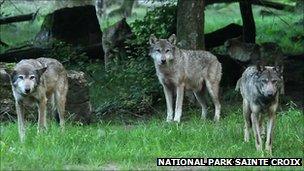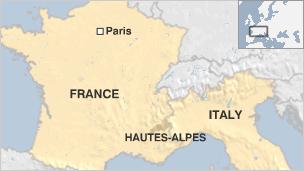Wolf makes a comeback in France
- Published

The recolonising wolves are are believed to have crossed into France from Italy in the 1990s
In the summer months high on the French Alps the sheep graze on rich pastures.
In the Hautes Alpes, they are currently feeding beneath ski lifts on slopes that will soon be covered by a thick layer of snow.
But this year the freedom to roam has been curtailed. Somewhere in the dark, dense forests a grey wolf is on the prowl.
The wolf was hunted almost to extinction in France in the 1930s but, protected as an endangered species, it is making a surprising comeback.
Some 200 wolves have colonised the southern regions of France, divided into about 20 packs. They are believed to have crossed from Italy in the mid-1990s and they are moving ever further north.
Lionel Serres has 250 sheep on the mountainside this summer. Each night he pens them in behind electric fences. But the wolf is a cunning predator and so far it has killed 17 of his ewes, while 10 more are missing.
Sheep spooked
On the day we met, he was busy trying to recover an ewe that had been grabbed by a wolf around the neck. Its fleece was matted, thick with blood.
.jpg)
This ewe has been grabbed by the neck
"We have had lots of dead and injured sheep," said Lionel. "The flock is in a pretty sorry state. Some are lame, they are stressed, and some are so frightened they have miscarried lambs."
At night the wolf will circle the pens until the sheep are spooked into jumping the electric fences.
And so costly are these losses that in recent weeks Mr Serres has been forced to hire another shepherd, who will sleep alongside the sheep at night.
He is not the only one with concerns. So angry are the farmers in this region, that on the road to Hautes Alpes, in south-eastern France, on the border with Italy, there are huge signs painted on the road - "NO to the wolf."
Two hundred wolves might not sound like a huge problem. But this year there have been almost 600 attacks in which more than 2,000 sheep have been killed. That constitutes a rise of 20% on the same period last year.
So, under pressure from farmers and faced with an increasing number of attacks, the local prefect has finally ordered a hunt for one individual wolf thought to be doing much of the damage.
Since an anti-hunting code was agreed in 2004, only four wolves have been killed in France. Under the present rules, the wolf can only be shot legally by government marksmen or by shepherds trained and licensed to defend their flocks.

Remy Saunier, the chief wolf catcher for the area, is now sending small, nightly patrols into the mountains.
'Mystical animal'
"The wolf will always take the easiest prey," he said. "If it's easy he comes back, and that's what he's done here, every other night. We have tried to scare it with lights and noise but it returns. It is only our presence in these mountains that are limiting the wolf attacks.
"Most people in France have welcomed the return of the wolf. It is a beautiful, mystical animal. But if these people woke in the morning to find their flock decimated, they might change their opinion."
Critics say there is no evidence wolf attacks are out of control and they blame some of these sheep deaths on wild dogs. Moreover, as farmers receive 130 euros (£115; $190) in compensation for every sheep killed by a wolf, critics claim there is an incentive to exaggerate the problem.
Jean-Francois Darmstaedter, the secretary general of Ferus, a French wolf protection agency, says the shepherds need to work harder to protect their sheep - though some shepherds, he points out, are wolf supporters.
"Remember there are eight million dogs in France and 200 wolves," he said.
"And I would bet there are more dog attacks in these mountains than wolf attacks. In this small region here we have a pack of 15 wolves, and something like 8,000 wild dogs. They aren't always in the mountains, but when they are, they cause a real mess."
'Heading for Paris'
Mr Darmstaedter questions why the wolf has inspired such opposition in France. In neighbouring Italy, he says, pack numbers are three or four times as big.
Rémy Saunier, chief wolf catcher of the Hautes Alpes: "There will always be attacks as long as there are wolves"
But then, the wolf has always provoked fear. In the 17th Century, so afraid were they of wolves, mostly rabid wolves, they were cursed in Gallic folklore by the story of Little Red Riding Hood.
At a fair in Marvejols, further to the west, wolf expert Jean-Marc Moriceau is plugging his latest book, titled Man Against the Wolf.
"The wolf is a successful predator," he said. "It can move huge distances in search of food. And we can safely assume that in 15 or 20 years' time, if no measures are put in place, then it's possible we will see one or two wolves hunting in the forests 80km to 100km [50-60 miles] south of Paris."
Some say the expanding nature of the wolf's habitat will require that more controls are implemented - in France they are calling for a "wolf parliament", in which farmers, supporters, and politicians can all have their say.
But the forests south of Paris are probably the grey wolf's limit. Western and northern France are no longer wooded or wild enough to sustain them - which means those who live in Paris, at least, can sleep easily in their beds.
- Published23 December 2010